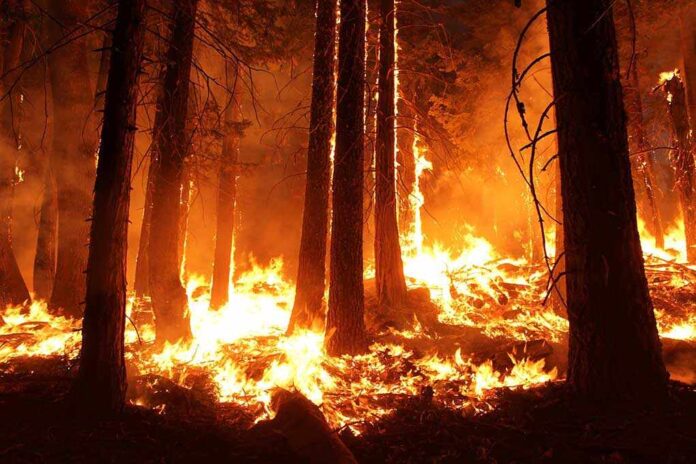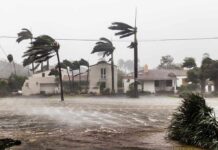
Canadian wildfire smoke is once again impacting air quality in the Northeastern United States, leaving health officials issuing stark warnings.
At a Glance
- Rutgers researchers examined particulate matter from a June 2023 wildfire affecting air quality in the Northeast U.S.
- A study found high concentrations of cancer-causing polycyclic aromatic hydrocarbons (PAHs).
- The wildfire smoke caused unhealthy air quality, impacting 70 million people in 32 states.
- Officials issued air quality alerts, urging residents with respiratory issues to take precautions.
Wildfire Smoke’s Return and Its Impact
Wildfire smoke from Canada is once again affecting large parts of the Northeastern United States, bringing with it a distinctive hazy appearance to the sky. This phenomenon is degrading air quality, resulting in increased respiratory distress among residents. Health officials are urging individuals with asthma, allergies, and other lung diseases to take extra precautions as they may experience exacerbated symptoms.
In addition to health advisories, the pervasive smoke is leading to reduced visibility, affecting both travel and daily activities. The haze is a stark reminder of the interconnectedness of our ecosystems and how natural disasters in one region can have far-reaching effects. Nearly 900 wildfires are currently burning across Canada, with smoke drifting south into the U.S.
Hazy in the DC area this afternoon with wildfire smoke drifting in from the north. Plenty of it over Canada and into the Northeast US. Most of this is aloft locally, but code yellow/moderate air quality in parts of the region. pic.twitter.com/tOTMtRM7oM
— Capital Weather Gang (@capitalweather) August 14, 2024
Research and Findings
Researchers at Rutgers University have assessed the physical and chemical characteristics of wildfire-related particulate matter. Their study, published in Environmental Science & Technology, will be featured on the journal’s cover. The research reveals high concentrations of cancer-causing polycyclic aromatic hydrocarbons (PAHs) during the wildfire peak, with particulate matter levels surpassing national air quality standards by almost ten times.
“Particulate matter is a leading environmental factor in the global burden of disease, with climate-driven wildfires being a major source,” said lead author Jose Guillermo “Memo” Cedeño Laurent, assistant professor at the Rutgers School of Public Health and director of the Rutgers Climate Adaptive and Restorative Environments Lab. “In the U.S., climate change-driven wildfires are reversing decade-long improvements in ambient air quality.”
Small particles from the wildfires can penetrate deep into the lungs, causing significant adverse health effects. The estimated inhalation dose of particulate matter over 72 hours was more than nine micrograms deposited in the lungs, far exceeding safety thresholds. The study’s findings are guiding ongoing research on the effects of particulate matter on various organs, underscoring the need for further investigation into wildfire-related air pollution.
Smoke from Canadian wildfires continues to be transported south by winds into the U.S. resulting in moderate to unhealthy air quality across parts of the Northeast, Mid-Atlantic, Ohio Valley, and Midwest on Friday. Some improvement is expected this weekend. Excessive rainfall may… pic.twitter.com/NMfv6Ft7Dn
— National Weather Service (@NWS) June 9, 2023
Current Situation and Warnings
The wildfire smoke’s extensive reach has led to air quality alerts being issued from Montana to the Dakotas and other states, including Nebraska, Alabama, Tennessee, Ohio, North Carolina, and the Northeast. By 7 p.m. Eastern time, nearly 70 million people in 32 states and the District of Columbia were affected. Chicago has notably experienced the worst air quality among major cities globally.
José Guillermo Cedeño Laurent added, “We found very large concentrations of ultrafine and fine particulate matter during the peak of this wildfire, surpassing almost ten times the national air quality standards and any previous record in more than five decades of air quality monitoring in the U.S. Northeast.”
Climate-driven wildfires are reversing improvements in ambient air quality in the U.S., highlighting the cross-border impact of these disasters. Efforts to mitigate risks from increasing wildfires are urgently needed, and ongoing research will undoubtedly play a key role in developing public health strategies.
Sources
- https://www.preventionweb.net/news/study-reveals-canadian-wildfires-are-affecting-us-air-quality-and-raising-health-concerns
- https://www.cnn.com/2023/07/16/weather/canada-wildfires-us-air-quality-alerts-sunday/index.html
- https://www.nytimes.com/2023/07/17/us/wildfire-smoke-canada-ny-air-quality.html
- https://www.washingtonpost.com/climate-environment/2023/06/07/air-quality-nyc-us-canada-wildfire-smoke/
- https://www.nbcnews.com/news/us-news/live-blog/poor-air-quality-live-updates-rcna91545
- https://www.reuters.com/business/environment/us-states-under-air-quality-alerts-canadian-smoke-drifts-south-2023-06-07/
- https://apnews.com/article/canadian-wildfires-chicago-smoke-air-quality-aqi-e120fa48b44e6c8560b13712ba76ee1d
- https://www.nytimes.com/live/2023/06/28/us/canada-wildfires-air-quality-smoke
- https://www.theguardian.com/environment/2023/jun/07/new-york-air-quality-alerts
- https://apnews.com/article/canadian-wildfires-chicago-smoke-air-quality-aqi-e120fa48b44e6c8560b13712ba76ee1d

























